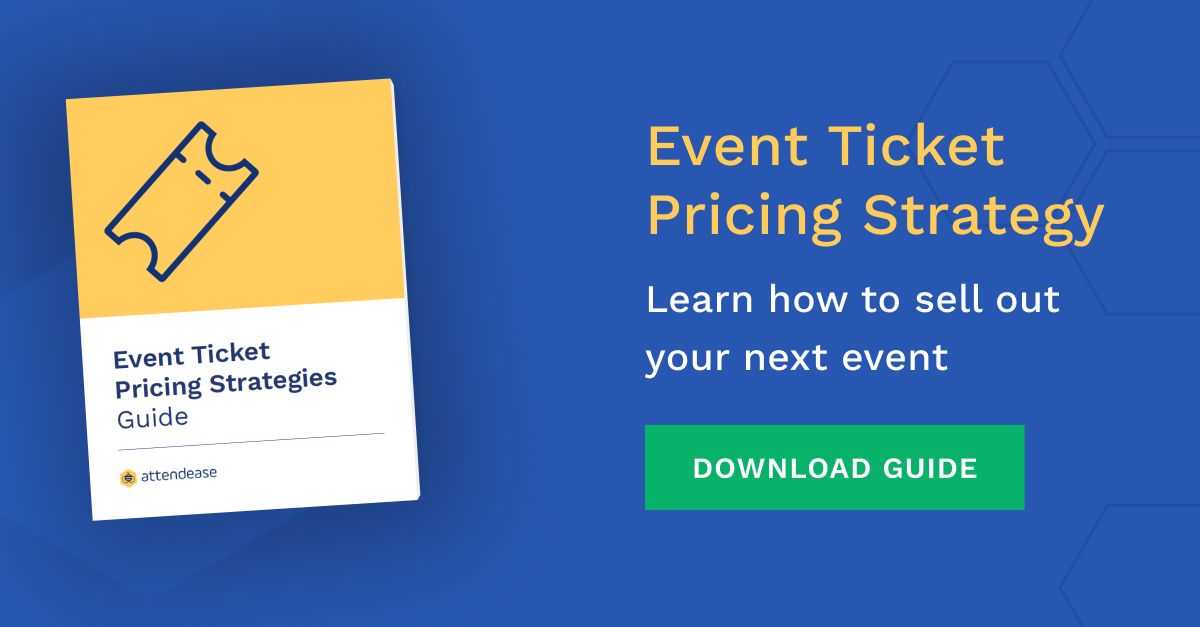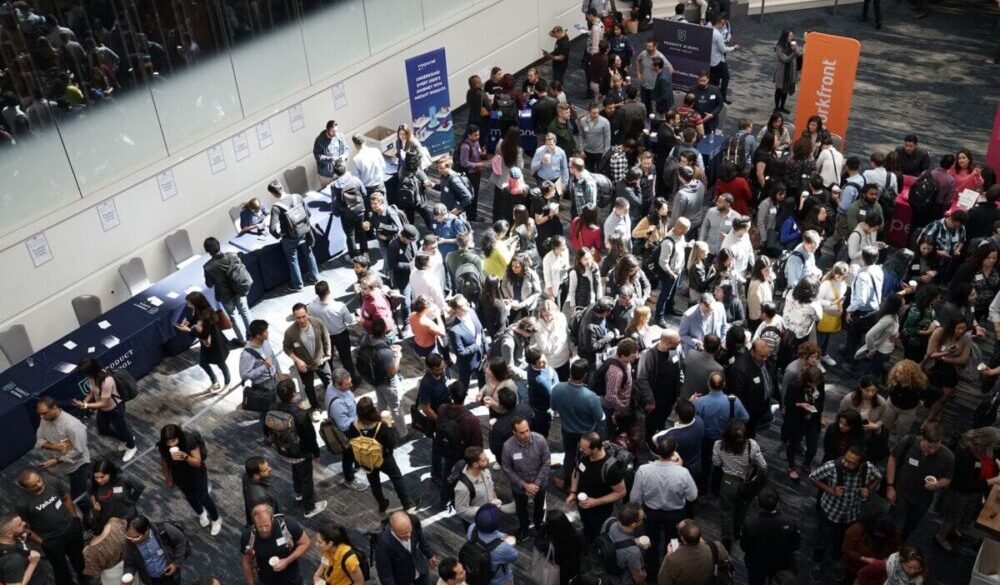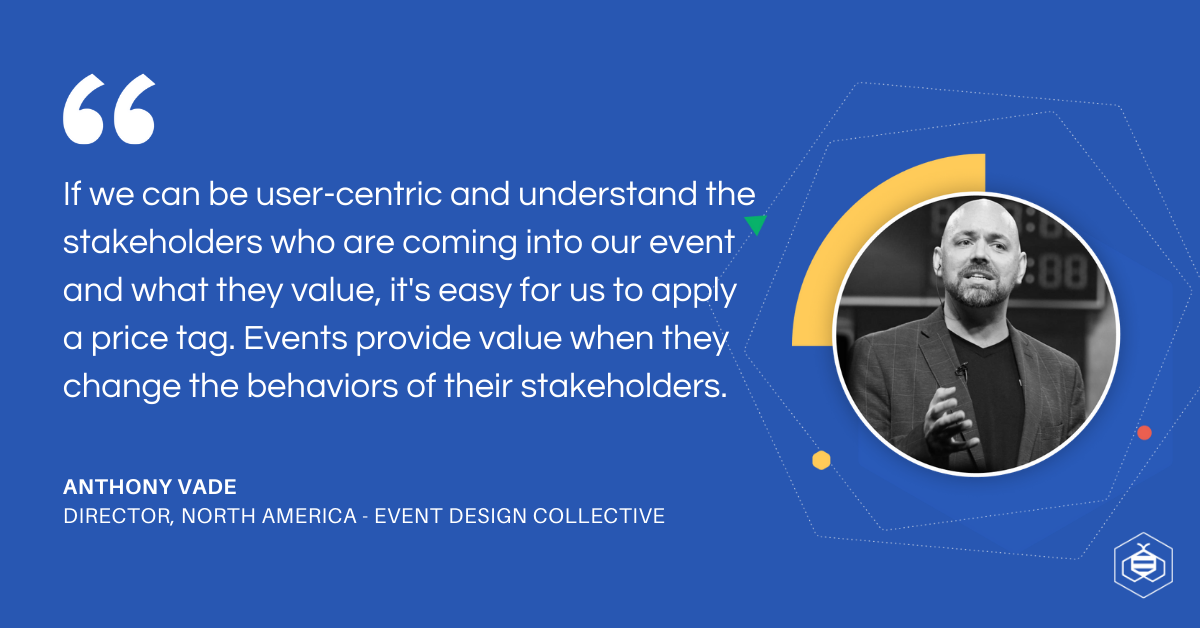How much you decide to charge for tickets can make or break your event. In this guide, we will cover proven ticket pricing strategies to help you determine your ticket prices and ensure the financial success of your event.
1. Determine Your Event’s Value
Before exploring ticket pricing strategies to drive event revenue, you’ll need to revisit your event design. In a talk with Anthony Vade, Director of North America at Event Design Collective, we learned just how crucial this step is.
Revisiting your event design means closely examining your stakeholders (attendees, sponsors, exhibitors, leadership, etc.), what they want to get out of the event, and what value the event will bring them. Once you know your event’s value, you’ll be able to apply a price tag to it confidently.
Here are a few key things Anthony Vade made note of around value:
Information Delivery Is No Longer Enough
While you might think that sharing information through presentations and workshops is what your audience wants to pay for, remember that information is now widely accessible and free thanks to the internet. For your event to have value to your stakeholders, it will need to provide connections and experiences, along with the information.
Experiences Carry More Weight
Some virtual events may be free, while others charge premium amounts if attendees want access to a deeper in-person or online experience. Intimacy, networking, and the chance to form close connections are major reasons why people are willing to pay more to attend events.
Events Provide Value When They Change the Behaviors of Their Stakeholders
Consider the following:
- Why do your stakeholders attend your event, and what do they leave with?
- What pain do they enter with, and what gains do they exit with?
- How does your event create transformations for your audience?
- What actionable takeaways is your audience walking away with?
All the above translates into your event’s unique value that, when articulated correctly, is worth investing in.
2. Uncover Your Event’s Value
How do you know that what you perceive your event’s value to be is correct? Will your stakeholders see it the same way? Following the methodology by the Event Design Collective, the way to uncover this is first to map the stakes for all your high-impact stakeholders:
- What is at stake?
- Who is involved?
- What is their contribution?
- What are their expectations?
Collaborate with your team and ask them to share their perspectives on what they think those stakeholders want so you can validate your hypotheses. You can do this by asking major stakeholders like attendees, event owners, and sponsors directly if your ideas are accurate and if they’re willing to pay what you’re planning to charge for the event. If you’re right, you’ve validated that what you’re about to offer is indeed what they want and are willing to pay for. If you’re wrong, then you can take that feedback until you get it right. Once you validate your stakeholder’s goals, you can then:
- Analyze how your event will help them achieve what they’re looking for.
- Justify the investment or expense of your event (e.g., buying a ticket or sponsoring a tradeshow booth).
3. Calculate Your Event Ticket Price
How Do You Determine Ticket Price?
Setting the right ticket price for your event involves a careful balance to attract attendees without compromising your financial goals. Here are key steps to help you determine the optimal ticket price:
Step 1: Establish Your Break-Even Point
Before setting your ticket price, calculate the total cost of organizing the event, including venue, refreshments, staffing, etc. Determine the minimum number of attendees required to cover these expenses and break even. This foundational step ensures that your pricing strategy aligns with your financial objectives.
Step 2: Analyze the Competitive Landscape
Conduct a competitive pricing analysis to understand the rates for similar events in your industry. Align your ticket prices with or slightly below the average to remain attractive to potential attendees.
Step 3: Explore Different Pricing Models
Consider innovative pricing models to enhance attendee engagement and increase revenue. Options such as early bird pricing, member discounts, or bundle pricing can create value for attendees while maximizing profitability for your event.
Step 4: Get Attendee Feedback
Engage with your audience by getting their input on ticket pricing. Conduct surveys through email or social media to understand their willingness to pay and the value they associate with your event.
Step 5: Assess & Adapt
Your initial ticket prices are not set in stone. Monitor attendee response and adjust prices based on the observed demand. If events consistently sell out, consider increases. If events consistently have low attendance, you may need to make price adjustments to attract more participants.
How to Determine Your Break-Even Ticket Price Point
Before you start thinking about pricing, you should know your numbers. Use a budget template to calculate your projected expenses and revenues. You then have an educated perspective on how much your tickets should cost in order to cover the expenses.
How to Research Other Events
Research other events in the market that are relevant to you:
- Regardless of location, similar events may give you a good idea regarding size, attendance, and pricing.
- Similar events near you which might compete against your event. Why would people choose to go to your event instead of a competitor’s?
Understanding the competitive space will indicate the range of ticket prices you should consider and the expected attendance numbers from similar events.
How to Forecast Ticket Sales
Based on your previous events and your competitors, you should be able to develop a realistic sales forecast. How many people are likely to attend the event? How many people can the venue hold? Once you find this number, you can divide it by the Break-Even point found earlier to calculate the minimum price you should sell your tickets for to pay for all expenses.
If you offer different purchasing options, bundled pricing may work for you. You can create perceived value by adding multiple items into one bundle at a reduced price compared to having all items purchased separately. This is also a good way to motivate the purchase of add-on items, such as meals, transportation, accommodation, activities, parties, and more.

4. Set Up Common Ticket Types, Pricing Strategies, & Sales Tactics
Once you have determined how much you should be selling your tickets for, draft your strategy to sell the tickets. Here are some different event ticket pricing strategies you may consider.
Early Bird Ticket Pricing & Tiered Early Bird Ticket Pricing
There is no surprise here: early bird sales are the easiest way to create awareness about the event and push sales in the early months of promotion. You can create a multi-tiered early bird strategy to push for even more event ticket sales. Here is an example of how to use the multi-tiered early bird structure:
| First 50 tickets at $100 |
| 50-100 tickets at $125 |
| Regular price at $175 |
One thing to keep in mind is that you should never extend your early bird rate. Doing so trains your audience to wait instead of acting, which is the whole point of the early bird strategy.
Timed Batch Event Ticket Pricing
Similarly to tiered early bird, you can create a tier based on milestone dates. You can create as many tiers as you wish, adding price increases as it gets closer to the event date. Make sure the increases are significant enough to make people want to purchase it early. An increase of at least 10% is recommended. Here is an example of timed batch event ticket pricing:
| Purchase by March 1st at $100 |
| Purchase by March 14 at $125 |
| After March 14, the regular price is $175 |
Odd/Even Event Ticket Pricing
This is an old marketing trick we all have heard of. Prices ending in odd numbers, such as 5 and 9, tend to outperform even numbers in terms of sales. Whether this is an old psychology trick or the real deal, it doesn’t hurt to try. You can test this strategy in different events to compare the results.
You should avoid cents and stick to a whole number—for example, $75 or $79 instead of $70.95. The price with no decimal numbers is perceived as lower, even though it may not be.
Bundled Event Ticket Pricing
If you are offering different purchase options, bundled pricing may work for you. You can create perceived value by adding multiple items into one bundle at a reduced price compared to having all items purchased separately. This is also a good way to motivate the purchase of add-on items, such as meals, transportation, accommodation, activities, parties, and more.
Event Up-Selling Strategy
If you don’t want to increase the total cost by using the bundle price, you should consider up-selling after the ticket purchase. That means you focus on selling the tickets for your event and contact them later to up-sell other items, such as meals, transportation, accommodation, after-parties, etc. This way, you can guarantee the event ticket and worry about items with lower margins later.
Event Ticket Price Discount Strategy
Whether you give a percentage discount of a fixed dollar amount, a discount can make all the difference based on the perceived value of the discount. Follow the “Rule of 100”, which uses percentage discount for ticket prices under $100 and dollar amounts for prices over $100. Here are some examples:
| Ticket price | Discount (%) | Discount ($) | Better Option |
| $10 | 20% | $2.00 | 20% |
| $20 | 20% | $4.00 | 20% |
| $100 | 20% | $20 | $20 |
| $500 | 20% | $100 | $100 |
Use Scarcity To Drive Event Demand
If your audience knows your previous event was sold out, chances are they might feel rushed to get their tickets early for the next event you host. With this in mind, you may choose a smaller venue to host your initial event as a strategy to increase demand for future events. Don’t forget to announce the selling-out situation when promoting a new event to encourage your audience to move quickly to secure their event tickets.
Offer a Top Tier Ticket Package
A premium ticket package and other cheaper options may make lower-priced tickets seem more attractive, increasing demand and sales. Even if you don’t sell too many higher ticket prices, this can help with regular-priced tickets. The VIP offers, which may include exclusive access perks, will appeal to a segment of your attendees who are looking for the best.
Promo Codes
Create promo codes for specific segments that can help push sales through referrals. For example, you can create a special code for your speakers, sponsors, and exhibitors so they can share the event with their audience. This will help increase your promotion reach, as your “partners” will promote directly with their audience, who might not necessarily know you and your event. Partners will feel more motivated to promote the event, knowing they are offering their audience a benefit while strengthening the relationship with you. Provide them with assets to share on social media to help with the event promotions.
Similarly, you can create promo codes for niche influencers in your industry so they can share the event with their audience.
5. Use Unique Ticket Pricing Strategies for Virtual Events
Ticket pricing strategies are even trickier when it comes to hosting virtual and hybrid events. As these events become more popular, the industry is in the process of figuring out the best ways to monetize these events. Here are a few ways you can price your virtual events:
Offer Flexible Event Ticket Pricing Options
Sliding scale: Rather than having a set price, you can offer attendees a sliding scale to give them options for how much they can afford according to their financial situation.
By donation: You can also offer attendees to pay by donation, so they choose how much to pay for the event. In this case, it can be wise to add a “suggested donation amount’ to educate them on the value of the event.
Free, excluding premium components: Another route you might consider is hosting your event free of charge but charging premium amounts if attendees want to get access to specific event components like the online networking platform, high-profile speaker sessions, or exclusive content. This option lets you set several ticket tiers so attendees can choose what suits them most.
Anchor Your Ticket Price On Desirable Experiences
In addition to offering an exciting program with a diverse agenda, you can anchor your price on additional experiences your event can provide, including:
Networking opportunities: Give your audience more points of interaction to create and strengthen connections. You can justify a healthy ticket price for your virtual event when you give attendees an exciting opportunity to connect with peers meaningfully.
Exclusive touch-points with experts: The chance to connect with experts privately or in small groups can be a huge selling point for attendees who value one-on-one time or exclusivity. This can take the form of private meetings or limited-capacity Q&A sessions where guests can connect with people at the very top of their field for an opportunity to pick their brains.
On-demand flexibility: Many virtual events are free to watch live but paid to have on-demand access to watch the recordings. This can be a good way to attract ticket sales as well.
6. Develop Strategies for Where & How To Sell Event Tickets
Your sales strategy should cover the channels you’ll be marketing through and how the sales will be executed.
Sell Event Tickets Online
Ensure customers can buy tickets to your event online. Selling online not only makes it convenient for customers, but it also frees up administration time for you and your team. One of the easiest ways to offer online sales is through an event registration platform. In addition to scheduling and attendee log-in capabilities, this type of platform offers features like different pricing categories, promo codes, and group passes.
Sell Event Tickets At The Door
It could work in your favor to offer tickets at the door as well as online, though this depends on the type of event. People could turn up at the last minute, which could help you fill up your event. However, you might want to charge slightly more at the door to encourage people to buy well before the event.
How to Use Marketing Channels to Sell Event Tickets
As for marketing, you should explore the different channels you’d like to market through.
- Search engines – You can use pay-per-click (PPC) or search engine optimization (SEO) to reach more potential leads through search engines.
- Social media – Leverage your social media channels. Social media could be a highly impactful way to get your message out there, generate awareness for your events, and reach a large group of people without expensive paid advertising. Concentrating on the two or three platforms your target audience uses the most is helpful. Ensure your attendees spend time on these platforms and that the content you share is tailored to your target audience and the platform.
- Customer database and re-targeting – Email your customer database and consider re-targeting leads who’ve shown interest in your events.
- Your network – Ask your event-management team, caterers, vendors, and other partners to help generate word-of-mouth interest in your events. Ask them to forward emails to their network and share posts on social media.
- Advertising and sponsorships – Expand your reach through billboards, radio advertising, local press, social ads, other paid advertising media, and related channels like sponsorships.
Leverage Effective Ticket Pricing Strategies & Sell Out Your Events With EventUp Planner’s Event Ticketing Platform
Sold-out events are the result of careful ticket pricing strategies and sales rather than chance. With a detailed ticketing strategy designed for your target audience, you’ll be better positioned to generate awareness, accelerate ticket sales, and sell out your events.
Want to learn more about how to sell out your events and make them a financial success? Download your ticket pricing strategies guide today. Or book a call with our team to learn how EventUp Planner (formerly Attendease) can help you.
Let's Talk!
Manage your entire event portfolio and drive down the cost per event with each additional event you execute. EventUp Planner has flat-fee pricing, with no surprises.
- For all meeting and event types
- For all event sizes
- For all functional teams
- For all use cases
Book a call with our team to learn how EventUp Planner fits your needs.


